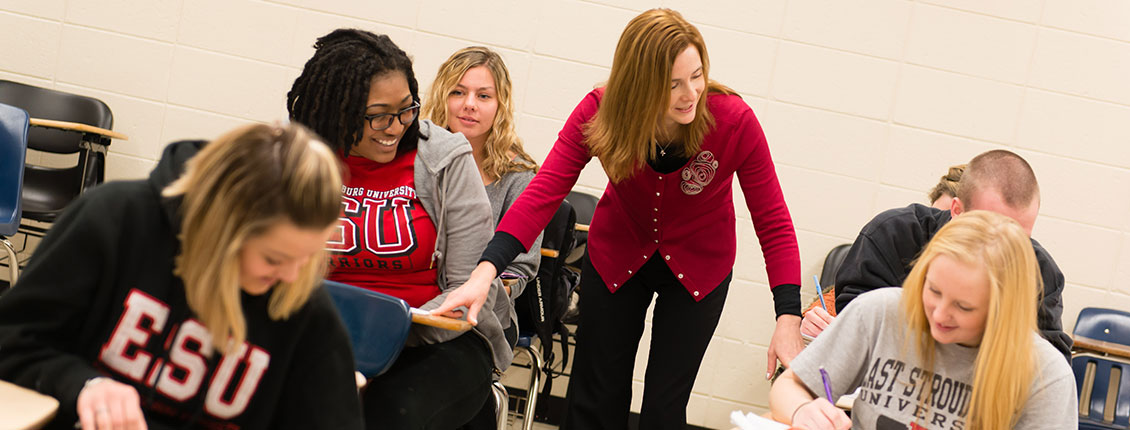
Rehabilitative and Human Services
Program Mission
The mission of the Rehabilitative and Human Services program at East Stroudsburg University is to prepare highly qualified professionals who will assist people with disabilities in becoming contributing members of inclusive communities.
Description of Program
The undergraduate Rehabilitative and Human Services program began offering a degree in 1993. The degree program prepares students to work in a broad range of rehabilitation and human service settings with youths through adults who have various types and degrees of disabilities.
These settings may include day service or employment settings, supported living, residential settings, and rehabilitation facilities. Although students may obtain employment in such settings upon completion of their degree, many students elect to pursue graduate study in fields such as vocational rehabilitation counseling as a Certified Vocational Rehabilitation (CRC) counselor and/or a Masters in Social Work (MSW).
In addition to the aforementioned graduate program, some students choose to pursue graduate studies in such fields as Occupational Therapy, Counseling and Applied Behavioral Analysis.
The Rehabilitative Services program provides an excellent foundation for graduate study in these areas. The Rehabilitative Services program is part of ESU’s Department of Special Education and Rehabilitative and Human Services.
Learning Outcomes
Core Competencies & Practice Behaviors
CORE-CUE Competencies
- Develop sensitivity, appreciation, and understanding of what it means to have a disability,
i.e., its medical and psychological aspects and what can be done to ameliorate resulting
problems
- identify the primary rehabilitation techniques employed to evaluate, train, and identify employment and independent living options for persons with a disability
- Identify physical and environmental adaptations which will enable consumers to work or acquire training
- Understand the major types, purposes, and operations of the myriad of human service
agencies serving individuals with vocational limitations
- Apply basic organizational principles, practices, and processes of rehabilitation services and the dynamics of human service delivery systems
- Review trends, societal issues, and local, state, and federal laws which affect rehabilitation service delivery
- Develop an awareness of changing demographics within the workforce (e.g., cultural diversity, gender ratios, age distributions, etc.)
- Determine the nature and needs of the various types of individuals with disabilities
served by rehabilitation and other human service agencies
- Utilize community resources during and after rehabilitation services to assure persons with disabilities attain a satisfactory vocational adjustment
- Compile and utilize assessments information such as prior records, test results, and other pertinent evaluation results
- Coordinate services on behalf of consumers with collaborating agencies (e.g., social, educational, financial, vocational, legal, transportation, and housing)
- Understand the basic applications of research principles to rehabilitation, such as the evaluation of personal practice, utilization of consumer satisfaction surveys, conducting needs analyses, etc.
- Apply interpersonal skills in interviewing and communication satisfactorily with persons
who have disabilities, their families, related professional, and general public
- Understand individual and group behavioral change interventions which will improve the employment potential of persons with disabilities
- Develop effective, sensitive communication skills to build rapport and channels of communication (e.g., active listening, giving and receiving feedback, and conflict resolution)
- Utilize ethical principles in the provision of services (e.g., integrity, confidentiality, scope of practice, etc.)
- Incorporate cultural sensitivity into daily practice and interactions with consumers
- Use problem solving skills to assist persons with disabilities in attaining individualized
goals suited to their abilities and needs
- Use writing skills for clear, concise, and accurate case reporting
- Engage in consumer advocacy on behalf of people with disabilities and facilitate consumer input into making informed choices
- Apply case management skills to disability benefit programs, while working to reduce disincentives to employment
- Utilize rehabilitation technology and adapted computer applications in service delivery
- Facilitate awareness of the world of work and the role of environmental factors in job analysis, job placement activities, and vocational adjustment
- Consult with and include the consumer as a service/system designer
- Provide consumers with information and assistance about human, legal, and civil rights so that they will be empowered to speak on their own behalf and obtain assistance when necessary
- Identify and prioritize goals with clients and consumers (or with their representatives when appropriate)
- Apply ethical principle and standards to rehabilitation case standards
- Resolve ethical dilemmas by applying problem-solving and decision-making skills
- Apply relevant legal principles to rehabilitation case situations
- Demonstrate application of rehabilitation skills through a supervised practical experience within a rehabilitation or rehabilitation-related service delivery program
Assessment
Students must have a 2.5 GPA in the Rehabilitation and Human Services major, a minimum of a “C” or higher in all required courses, and an overall GPA of 2.0 to satisfy requirements for completion of the major. Additionally, they must complete an internship to be evaluated by their university supervisor and agency supervisor, and complete required field based assignments as indicated in the Rehabilitation and Human Service Manual.
Careers (description or list of setting, possible jobs, etc.)
Possible career opportunities are focused on a wide-range of human service fields of practice including:
- Behavioral Health Programs
- Drug and Alcohol Programs
- Assisted Living Facilities
- County Children and Youth Programs
- Rehabilitation Facilities
- Residential Programs / Group Homes
- Supported Employment Programs
- Centers for Independent Living Programs
- School Transition Programs
- Child Welfare Services
- Offices of Aging
- Homeless Assistance Agencies
- Anti-Poverty Programs
Professional Licensure Disclosures and Distance Learning State Authorization: Applicants who are applying to programs that may lead to licensure in states other than Pennsylvania must be aware of the various state professional licensure requirements. Please see ESU's professional licensure disclosures, Evaluation of Conduct Record, and check licensure requirements by occupation and state at CareerOneStop.
Contact Us
Contact Information
- Campus Address
- Stroud Hall 105 D
- Phone:
- (570) 422-3558
- Title of Department Leader
- Department Chair Special Education & Rehabilitation
- Name
- Dr. Gina Scala
- E:
- gscala@esu.edu
- Phone:
- (570) 422-3781



